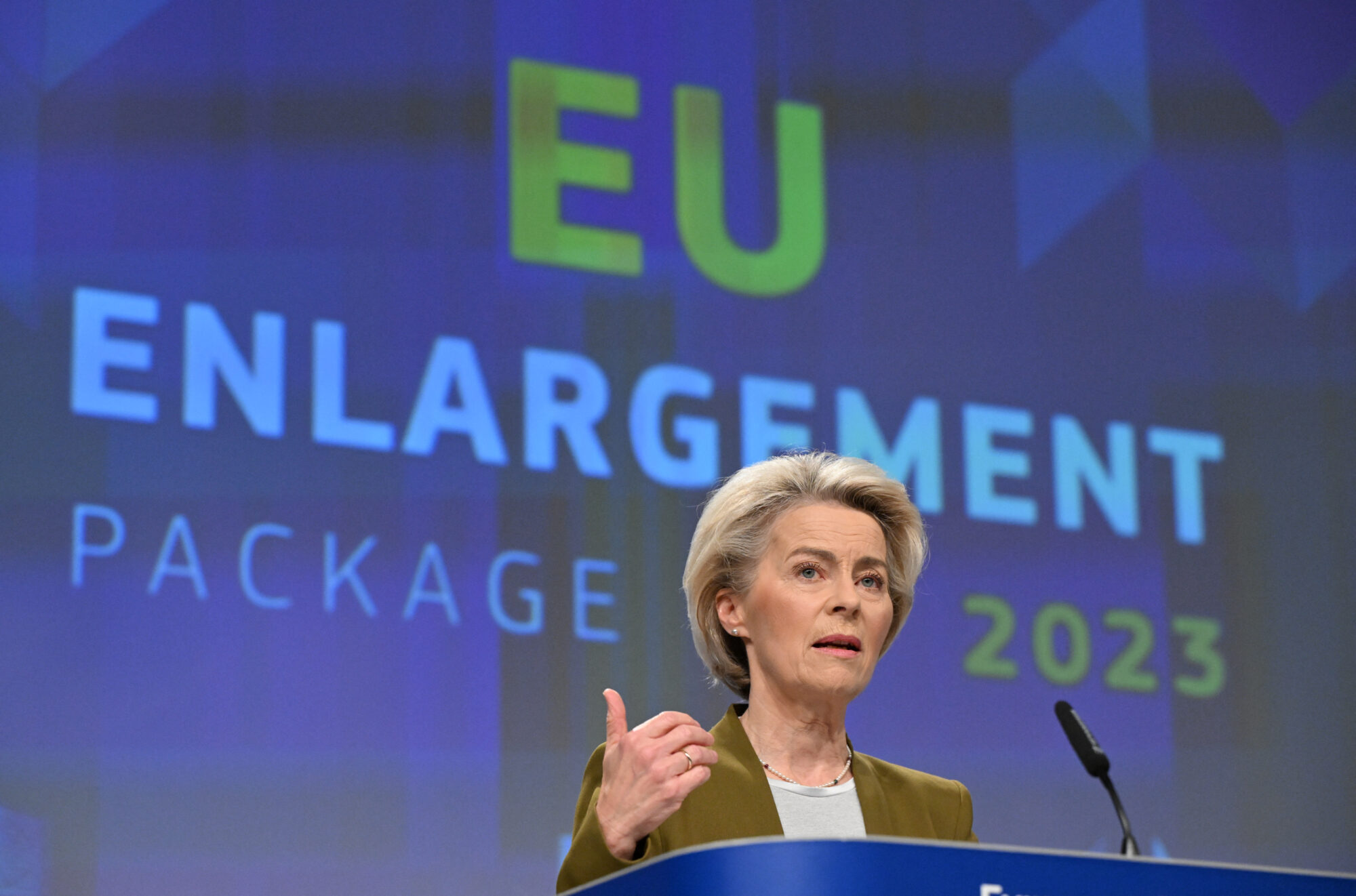
President of the European Commission Ursula von der Leyen holds a press conference on the 2023 Enlargement package and the new Growth Plan for the Western Balkans at the EU headquarters in Brussels, on November 8th, 2023.
Photo: JOHN THYS / AFP
A European Union counting Ukraine and Moldova among its members has received its executive’s imprimatur.
On November 8th, the European Commission proposed accession talks with Ukraine and Moldova to be initiated by the European Council, composed of 27 national EU leaders, which is to make its final decision in December.
On X, formerly Twitter, European Commission President Ursula von der Leyen, lauded the Ukrainians for “deeply reforming their country and preparing for accession, even as they are fighting an existential war.”
Ukrainians are deeply reforming their country and preparing for accession,
— Ursula von der Leyen (@vonderleyen) November 8, 2023
even as they are fighting an existential war.
Today the Commission recommends that the Council opens accession negotiations with Ukraine. pic.twitter.com/XNuyZigoZu
It is on the proviso that Kyiv steps up its fight against its long-running issue of corruption (a point most sharply made by former European Commission President Jean-Claude Juncker in early October), adopt a law on lobbying in line with EU standards, and strengthen national minority safeguards, that such talks would be launched.
In a post on X, Ukrainian President Volodymyr Zelensky welcomed the European Commission’s recommendation, noting it marks a “strong and historic step that paves the way to a stronger EU with Ukraine as its member,” as he pledged that his country “continues on its reform path.”
I welcome today’s recommendation by the European Commission to open EU accession negotiations with Ukraine.
— Volodymyr Zelenskyy / Володимир Зеленський (@ZelenskyyUa) November 8, 2023
This is a strong and historic step that paves the way to a stronger EU with Ukraine as its member.
I thank the EU and personally @vonderleyen for supporting Ukraine on… pic.twitter.com/7py1imxCRT
The image as an aspiring, liberal democracy continues to be a hard one for Kyiv to sell, however.
Only last Monday, a rift between the president and his top general, Valery Zaluzhnyi, became very public, as the latter—contradicting his employer—said in an interview with The Economist that Ukraine had gotten itself in a stalemate with Russia, much akin to World War I conditions.
Sensing the country’s unity was fraying, which would see his political future imperiled, later that day Zelensky said during a speech it was not the right time for wartime elections since Ukrainians could be drawn into dangerous infighting that could hamper the war effort.
Though a majority of Ukrainians still support Zelensky, opinion polls suggest that trust in their leader is slowly fading.
A study from last October by the Kyiv Institute of Sociology revealed that from May 2022 to October 2023, trust in the president decreased from 91% to 76%, with trust in the government plummeting from 74% to 39%.
Moldova, Ukraine’s neighbor, similarly received the greenlight, since it had “undertaken significant reforms, despite constant destabilization efforts against its democracy,” von der Leyen said, in reference to accusations Russia was behind these efforts.
Moldova has undertaken significant reforms, despite constant destabilisation efforts against its democracy.
— Ursula von der Leyen (@vonderleyen) November 8, 2023
The Commission recommends that the Council opens accession negotiations.
Moldova’s president, Maia Sandu, was “grateful for the full-hearted support” from the European Commission, as she pledged her nation would remain “committed to the hard work needed to join the EU.”
Grateful for the full-hearted support.
— Maia Sandu (@sandumaiamd) November 8, 2023
Moldova remains committed to the hard work needed to join the EU. https://t.co/uvivHHFGke
The Commission also recommended EU accession negotiations with Bosnia and Herzegovina to be opened, “once the necessary degree of compliance with the membership criteria is achieved.”
During a press conference, von der Leyen said the EU is “opening the door very wide and we invite Bosnia and Herzegovina now to go through this door,” but that “results have to be shown.”
EU countries are currently split on the matter, with Austria, Hungary, Slovenia and Croatia in support, while the Netherlands and others are firmly against.
In addition, the country of Georgia (which has Russia as its neighbor to the North) has been granted candidate status “on the understanding that the government takes important reform steps,” von der Leyen added.
The Commission recommends to grant candidate status to Georgia on the understanding that the government takes important reform steps.
— Ursula von der Leyen (@vonderleyen) November 8, 2023
Steps that mirror the genuine aspirations of the overwhelming majority of its citizens to join the European Union. pic.twitter.com/J9JQZuAXjM
This would require Georgia to align itself with the EU’s foreign policy sanctions [among which, of course, those on Russia], pushing back against disinformation and political polarization, as well as ensuring a free and fair 2024 election, as reported by Reuters.
In addition to Ukraine, Moldova, Bosnia-Herzegovina, and Georgia, the European Commission is considering Serbia, Turkey, North Macedonia, Montenegro, Kosovo, and Albania as future EU Member States.
EU negotiations with Albania, Montenegro, North Macedonia, as well as Serbia (to which Kosovo’s are tied, since a normalization of their relations is a prerequisite) are progressing at a snail’s pace.
While Turkey started EU accession negotiations in 2005, various political disagreements have put that process on hold indefinitely.
